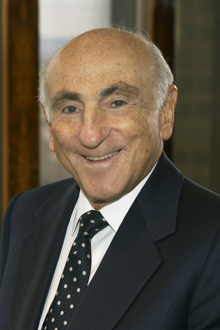Schwartz tells Americans to be more responsible
Talk part of International Business School's New Year's celebration

Bernard Schwartz
Americans should take more personal responsibility for the economy and do a better job of holding the business community and regulators accountable for their actions, prominent businessman, philanthropist, and progressive-policy advocate Bernard Schwartz told participants in Brandeis International Business School’s sixth annual New Year’s Celebration in New York City recently.
“The responsibility is ours,” Schwartz said. “It's not the guy in the White House. He has his job, but we have ours. I believe in American exceptionalism, even though it's not very popular to say that. We have to gear ourselves up; we have to participate. I'm a great believer that we will do the right thing.”
In a wide-ranging talk that covered topics from the persistently high unemployment rate to Wall Street’s loss of confidence in President Barack Obama to the principles of successful leadership, Schwartz, who for 34 years ran Loral Space & Communications, struck a tone of pragmatic optimism.
He said the United States is amidst a period of great economic and political change, transforming from a hegemonic force in finance, innovation, science and military affairs to one that must adopt a more cooperative engagement with the rest of the world. “Change and metamorphosis is something that this country is used to,” he said. “We've built an extraordinary country… There's lots be proud of. There's a lot to be confident about.”
Schwartz spoke to an overflow crowd of Brandeis alumni and officials, including Fred Lawrence, who took office as the school’s eighth president on Jan. 1, and Bruce R. Magid, dean of the business school. The Perlmutter Institute for Global Business Leadership sponsored the talk, and Louis Perlmutter ’56, founder of the institute and a Brandeis trustee, served as moderator.
Perlmutter quizzed Schwartz on the rash of criticism Obama has faced from the business community for his efforts to expand regulatory requirements in the aftermath of the global economic meltdown. Schwartz, a life-long supporter of the Democratic Party, acknowledged that some recent financial reform has been heavy-handed, but defended the need for watchdogs.
“I regret to say that some very bad things were done by the business community, the banking community, and the regulatory community in the last few years,” he said. “I am a good capitalist, but I would not want to live in a society where there is no regulation of business.”
He said the best way for Obama to regain the trust and confidence of the business community is to hire more people from the business and investment world in his administration.
Schwartz, who today is chairman and chief executive officer of BLS Investments, his private investment firm, also said that political leaders are not doing enough to bring down the high unemployment rate -- a policy failure that is stalling the economic recovery. The unemployment rate stands at more than 9 percent, according to the U.S. Bureau of Labor Statistics. “We have 19 million people unemployed in this country, and also people who are underemployed, and they have real problems,” he said. “I don't see anything on the horizon in terms of policy from either party that approaches the problem. Job creation should be the number one priority.”
Schwartz led Loral Space & Communications and its predecessor company, Loral Corporation from 1972 to 1996. During that period, Loral, a designer and manufacturer of state-of-the-art hardware for the defense and aerospace industries, posted 96 consecutive quarters of increased earnings. The company’s market value rose from $7.5 million to $15 billion over that time.
Schwartz attributed the success both to his long-term view on business decisions, and his equitable approach to issuing company stock. “Number One: we had a much broader responsibility than just making money,” he said. “I used to say to our shareholders that my responsibility was not only to [them]. My responsibility was also to my colleagues, employees, customers, and my community. We made investments in Loral that did not have immediate return and that depressed our earnings-per-share. But they were long-term investments.”
“Number two, we were all invested in the company. One of the things I did with easy abandon was to issue Loral stock to executives. We were truly a family. When one benefited, we all benefited,” he said.
One member of the audience, Stacey Levine ’06, M.A. ’07 said she felt heartened by Schwartz’s talk. “As a young person who started my career during the crash, it's exciting to hear someone who has a lot of experience and perspective in the banking world sound so positive,” said Levine, who works in financial services in Manhattan. “His outlook is realistic but also hopeful.”
Categories: Business






